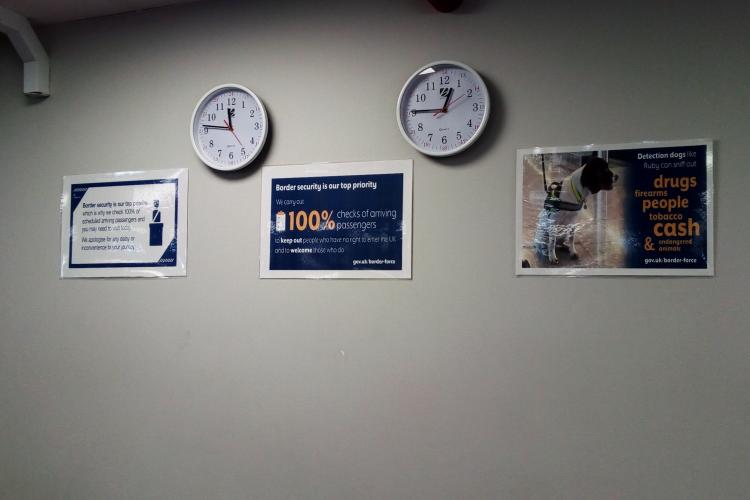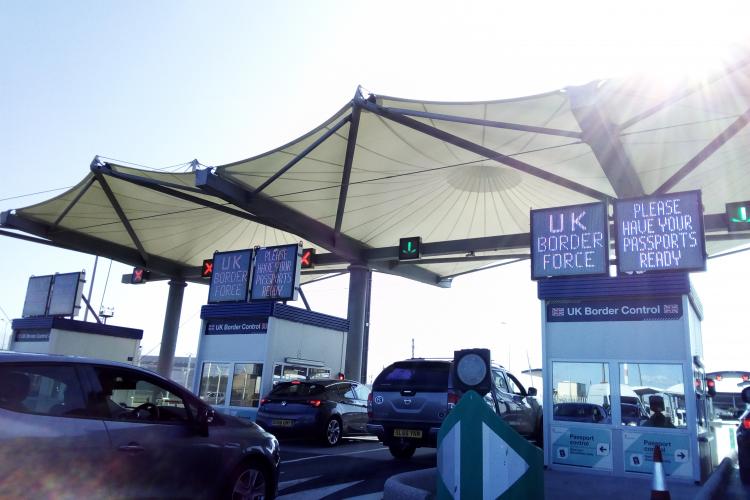Experimenting, Exporting and Outsourcing the ‘Hostile Environment’: A Study of Immigration Control at the UK-France Frontier
Posted:
Time to read:
Post by Frances Timberlake. Frances is a campaigner and activist who has been working with displaced communities in northern France since 2016. This blog post introduces her MA dissertation on the UK-France border arrangements, which came runner-up in Border Criminologies’ Masters Dissertation Prize 2020. The piece was written in August 2019 for her MA in International Human Rights Law at the school of Oriental and African Studies (SOAS). Frances now works as UK Research and Policy Co-ordinator at Refugee Rights Europe.

Despite increasing academic interest in the impact of externalised borders in recent years, the UK’s ‘exportation’ of its border controls into France has received relatively little attention.
A set of bilateral legal and political agreements implementing juxtaposed border controls on British and French territory, have over the last thirty years resulted in a harsh militarisation of the border region, a blockage of prospective asylum seekers on the northern French coastline and extremely hostile living conditions engineered in order to deter migrants from reaching the area and attempting the crossing to the UK. The 1991 Sangatte Protocol and 2003 Le Touquet Treaty are the founding agreements for these juxtaposed controls, and effectively grant the UK the power to carry out border controls, arrests and short-term detention on French soil.
This thesis explores the intersection of border enforcement, criminal powers and financial investment that has been engendered by these juxtaposed control agreements. In it, I argue that the juxtaposed controls at the UK-France border act as experiments in immigration deterrence, prefiguring the ‘Hostile Environment’ policies first appearing domestically in 2012 and acting as a prototype for European-wide forms of border externalisation and non-entrée policies. The first section looks at the historical development of the juxtaposed controls as a policy response to shifting forms of immigration, whilst the second section examines the implementation of this zone of deterrence through the engineering of hostile living conditions, heightened security and surveillance measures, harsh policing and offshored detention practices. The final section considers the (il)legal impacts of the border arrangements and, through the lens of European case law and international legal standards on extraterritorial jurisdiction and non-refoulement, proposes opportunities to legally challenge the UK’s practices of interception, detention and expulsion operated abroad. In this regard, the thesis analyses the juxtaposed controls agreements as the source of insecurity for undocumented people in the border region, whilst reflecting critically on UK legal accountability for this in light of its extraterritorial administrative, financial and legal control in France.
Since the writing of this paper, the situation for displaced people at the UK-France border has continued to degrade. Tightened border controls and security measures have resulted in a shift towards new, increasingly dangerous crossing routes from France to the UK, in particular by small boats across the Channel. Whilst there has been a spike in UK media coverage of this, there has been little corresponding analysis of the juxtaposed controls agreements that have created a securitised zone of illegality, legitimising the criminalisation of those in the area through both law and policy. As the UK heralds its “end to freedom of movement once and for all” and the English Channel becomes a symbolic battleground on which to do this, it is particularly important to look at the legal infrastructure behind the UK’s implementation of its border controls and how we might challenge this through law.

During the writing of this paper, new forms of border and immigration control in relation to the UK-France frontier were being expanded, and have since continued to take on new forms. Examples of these include the increased expedited removals of people who crossed the Channel from France, £28 million of UK money invested in increased French police patrols to render ‘unviable’ small boat crossings across the Channel, and a new policy to render inadmissible any asylum claimant arriving through a ‘safe third country’.
With increased calls for a renegotiation of, or end to, these juxtaposed controls agreements post-Brexit – from both the French and British sides – a clearer understanding of the long-term development, aims and failures of this form of border externalisation is paramount. This thesis offers a historical background to the juxtaposed controls and their shaping of the situation at the UK-France border, and a legal analysis that identifies ways to hold accountable a policy setup designed to circumvent accountability. It is thus likely to provide both theoretical background and practical responses in the context of important growing scrutiny of the UK’s border and immigration regimes.
Any comments about this post? Get in touch with us! Send us an email, or post a comment here or on Facebook. You can also tweet us.
__________
How to cite this blog post (Harvard style)
Timberlake, F. (2021). Experimenting, Exporting and Outsourcing the ‘Hostile Environment’: A Study of Immigration Control at the UK-France Frontier. Available at: https://www.law.ox.ac.uk/research-subject-groups/centre-criminology/centreborder-criminologies/blog/2021/02/experimenting [date]
Share:








